 As we celebrate our 60th year, we come prepared, with maturity from lessons learned and humility from understanding the depth of knowledge we have yet to achieve. At the National Institute of Diabetes and Digestive and Kidney Diseases, these lessons have brought myriad discoveries, from developing heart catheterization techniques that help diagnose circulatory disorders in the 1950s to determining the principles for introducing gene modifications in this century – two Nobel Prize-winning contributions to public health among many.
As we celebrate our 60th year, we come prepared, with maturity from lessons learned and humility from understanding the depth of knowledge we have yet to achieve. At the National Institute of Diabetes and Digestive and Kidney Diseases, these lessons have brought myriad discoveries, from developing heart catheterization techniques that help diagnose circulatory disorders in the 1950s to determining the principles for introducing gene modifications in this century – two Nobel Prize-winning contributions to public health among many. And at 60, we look ahead to what we need to achieve next.
In our intramural labs and Clinical Center, we strive to move research from bench to bed seamlessly. In December, researchers in Dr. John F. Tisdale’s lab discovered that, for adults with sickle cell disease, a modified blood adult stem-cell transplant regimen effectively reversed the disease in nine of 10 adults. In May, we helped educate women about the long-term risks and follow-up needed after gestational diabetes. In July, Dr. Jeffrey Kopp helped explain a link between higher risk of kidney disease and lower risk of African sleeping sickness. These discoveries are the steps and leaps that lead to better health.
They are steps and leaps best taken together, with intramural and extramural efforts. To that end, our Institute provides thousands of grants to the nation’s most promising researchers. Early this month, for example, the NIDDK-funded African-American Study of Kidney Disease and Hypertension announced the finding that a lower blood pressure goal benefits African-Americans with chronic kidney disease and protein in their urine.
At NIDDK, we now broach our next 60 years with driven focus. We look for opportunities to improve our medical knowledge, to pass on what we’ve learned and to improve the outcome for people dealing with diabetes and digestive and kidney diseases. Our mission: to improve our nation’s health by tackling these challenges head on.
In good health, 
Griffin P. Rodgers, M.D., M.A.C.P.
Director, National Institute of Diabetes and Digestive and Kidney Diseases
 Researchers recently announced results from the NIDDK-led HEALTHY clinical trial, which examined whether a middle school-based intervention could lower risk factors for type 2 diabetes.
Researchers recently announced results from the NIDDK-led HEALTHY clinical trial, which examined whether a middle school-based intervention could lower risk factors for type 2 diabetes. The study was conducted in schools with a high enrollment of minority children and youth from low-income families, as these populations have been particularly affected by the obesity epidemic. The intervention was found to lower the obesity rate in students at highest risk for type 2 diabetes — those who started out overweight or obese in sixth grade.
However, schools that implemented the program did not differ from comparison schools in the study’s primary outcome. Surprisingly, the prevalence of overweight and obesity in students combined had declined by 4 percent in both the intervention and control schools by the end of the three-year study. One possible explanation is that comparison schools may have independently implemented healthful changes because of increased awareness about the problem of childhood obesity fostered by the study. The HEALTHY results help inform future school-based efforts to reduce overweight and obesity in children.
For more information on the study, published in the June 27 issue of the New England Journal of Medicine, go to www.nih.gov/news/health/jun2010/niddk-28.htm.

On average, a lower blood pressure goal was no better than the standard blood pressure goal at slowing progression of kidney disease among African-Americans
who had chronic kidney disease resulting from high blood pressure, according to recent results of the African-American Study of Kidney Disease and Hypertension (AASK), the largest and longest study of chronic kidney disease in African-Americans. However, the blood pressure goal did benefit people who also had protein in the urine. The study, funded by NIH, appears in the Sept. 2 issue of the New England Journal of Medicine. Link: www.nih.gov/news/health/sep2010/niddk-02.htm. Gene variants in APOL1 come with both health risk and reward, as researchers – including one NIDDK intramural researcher and several others with NIDDK and other NIH funding – found when they built on a discovery linking variants in an MYH9 gene to higher risk for types of kidney disease. Now researchers report that much of that risk is actually due to variants in an adjacent gene, APOL1, which also appears to protect against African sleeping sickness. This finding – published in Science – may help improve treatments for both health issues. Link: www.nih.gov/news/health/jul2010/niddk-15.htm.
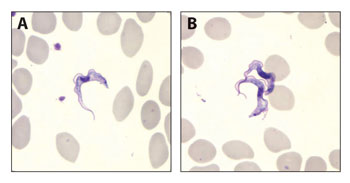 | A, B: Trypanosoma brucei ssp. in thin blood smears stained with Giemsa. The two Trypanosoma brucei subspecies that cause African trypanosomiasis, T. b. gambiense and T. b. rhodesiense, are indistinguishable morphologically. A typical trypomastigote has a small kinetoplast located at the posterior end, a centrally located nucleus, an undulating membrane, and a flagellum running along the undulating membrane, leaving the body at the anterior end. Trypomastigotes are the only stage found in patients. Trypanosomes range in length from 14 to 33 µm. Source: www.cdc.gov |
Co-funded by NIDDK, the Consortium of Food Allergy Research (CoFAR), established in 2005, will be funded for five more years. CoFAR will continue to foster new approaches to prevent and treat food allergies and also expand in scope to include research on the genetic causes underlying food allergy and studies of food allergy-associated eosinophilic gastrointestinal diseases. Link: www.nih.gov/news/health/jul2010/niaid-14.htm. 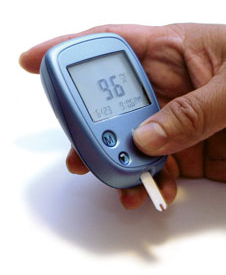
In high-risk adults with type 2 diabetes, researchers have found that two therapies may slow the progression of diabetic retinopathy, the leading cause of vision loss in working-age Americans. The Action to Control Cardiovascular Risk in Diabetes (ACCORD) eye study found that intensive blood glucose control reduced the progression of diabetic retinopathy compared with standard blood glucose control, and combination lipid therapy with a fibrate and statin also reduced disease progression compared with statin therapy alone. Link: www.nih.gov/news/health/jun2010/nei-29.htm.
Two common operations for stress urinary incontinence help women achieve similar levels of dryness, according to a team of urologists and urogynecologists who compared the treatments in a large U.S. trial published in the June 3 New England Journal of Medicine. The trial found that the two most common mid-urethral sling procedures are similar in their chance of cure, though each surgery has different risks. Link: www.nih.gov/news/health/may2010/niddk-18.htm. A daily dose of a specific form of vitamin E significantly improved the liver disease nonalcoholic steatohepatitis
(NASH), according to a study funded by NIDDK. Results were published April 28 online in the New England Journal of Medicine. In addition, Actos (pioglitazone), a drug used to treat diabetes, also improved many features of NASH but was associated with weight gain. Link: www.nih.gov/news/health/apr2010/niddk-28.htm.
For more information on these and other NIDDK-related advances, go to: www2.niddk.nih.gov/News/.
NIDDK’s 60th Anniversary
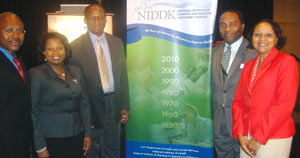
Events surrounding NIDDK’s 60th anniversary will continue all year. (include one photo from gallery – ISHIB works) See photos and video of recent events. For grantees, acknowledge Institute support by adding a slide to your presentation or label to your poster with easy downloads. Check out NIDDK presentations, panels and symposia with our calendar of events. Find these resources and more at: www2.niddk.nih.gov/60thAnniversary.htm From left, Dr. Charles N. Rotimi, director of the Center for Research on Genomics and Global Health, Inherited Disease Research Branch of the National Human Genome Research Institute; Dr. Suzanne Nicholas, associate professor at the University of California Los Angeles; Dr. Lawrence Agodoa, director of NIDDK's Office of Minority Health Research Coordination; Dr. Griffin P. Rodgers, director of NIDDK; and Dr. Shawna Nesbitt, president of the International Society on Hypertension in Blacks, celebrate 60 years of research through NIDDK at the July 9-10 annual ISHIB meeting in Arlington, VA. Credit: Courtesy of the International Society on Hypertension in Blacks

Important Changes to NIH Applications
Starting this year, all applications for NIH grants have to comply with new instructions, including shorter page limits and restructured application forms. Find information and resources regarding the changes at: http://enhancing-peer-review.nih.gov/restructured_applications.html. Post-submission Materials Policy
For most applications submitted on or after the Sept. 25 receipt date: - NIH will only accept post-submission materials resulting from unforeseen administrative issues.
- The deadline for receiving the materials will be 30 days before the review meeting.
- Submission requires “active concurrence” from the authorized organization representative.
For more information, see: http://grants.nih.gov/grants/guide/notice-files/NOT-OD-10-091.html. Funding Opportunities:
www2.niddk.nih.gov/Funding/FundingOpportunities/ Grants and Contract Notices:
www2.niddk.nih.gov/Funding/FundingOpportunities/Notices

In June, Rep. Frank Pallone, Jr. (D-N.J.), a senior member of the House Energy and Commerce Committee and chair of the Subcommittee on Health, introduced House Resolution 1444, recognizing NIDDK’s 60th anniversary. Later that month, a Congressional breakfast attended by Reps. Nita Lowey, Diana DeGette, Zack Space and Gene Green was held in honor of the anniversary.
Sponsored by advocacy and professional groups, the event honored four scientists who made major contributions toward advancing research under NIDDK’s purview. Drs. Phillip Gorden, David Nathan, and Jeffrey Gordon received NIDDK Distinguished Scientist awards and Dr. Theo Heller received an NIDDK Early Career Investigator Award (http://nihrecord.od.nih.gov/newsletters/2010/09_03_2010/story4.htm). 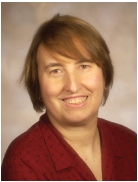
Also in June, Dr. Judith Fradkin, director of the Division of Diabetes, Endocrinology and Metabolic Diseases, testified on “A Way Out of the Diabetes Crisis in Indian Country and Beyond” before the Senate Committee on Indian Affairs. In July, Fradkin testified on “The Battle Against Diabetes: Progress Made; Challenges Unmet” before the House Energy and Commerce Subcommittee on Health.
In April 2010, Dr. Griffin P. Rodgers joined NIH Director Dr. Francis Collins in giving testimony on the President’s FY-2011 budget request for NIH before the House Appropriations Sub-Committee on Labor, HHS, Education, and Related Agencies (www2.niddk.nih.gov/AboutNIDDK/BudgetAndLegislativeInformation/FY2011_House_Appropriations_Testimony.htm).
In 2009, Rodgers testified on the progress in type 1 diabetes research before the Senate Committee on Homeland Security and Governmental Affairs Sens. Joe Lieberman and Susan Collins held the hearing, titled “Type 1 Diabetes Research: Real Progress and Real Hope for a Cure,” in conjunction with the Juvenile Diabetes Research Foundation International biennial Children’s Congress. Also testifying were actress Mary Tyler Moore, boxing legend Sugar Ray Leonard, and singer-songwriter Nick Jonas of the Jonas Brothers, who urged Congress to continue support of type 1 diabetes research. Rodgers highlighted scientific advances made possible by the Special Statutory Funding Program for Type 1 Diabetes Research, described here: http://www.t1diabetes.nih.gov/. For testimony: Recent Advances and Future Opportunities in Type 1 Diabetes Research For more written testimony, the President’s FY-2011 budget request for NIDDK and related information, go to: www2.niddk.nih.gov/AboutNIDDK/BudgetAndLegislativeInformation. | 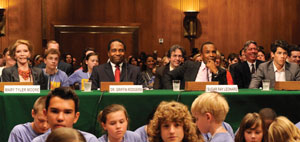 From left, actress Mary Tyler Moore, NIDDK Director Dr. Griffin Rodgers, boxing legend Sugar Ray Leonard, and singer-songwriter Nick Jonas of the Jonas Brothers urged Congress to continue support of type 1 diabetes research while testifying before the Senate Committee on Homeland Security and Governmental Affairs in 2009. |
 Since Feb. 17, 2009, when President Barack Obama signed the American Recovery and Reinvestment Act into law, NIDDK staff have been working to ensure that the Institute’s share of Recovery Act funds is invested in high-quality, scientifically meritorious projects. As of Aug. 20, 2010, NIDDK has funded approximately 2,000 ARRA awards. All pending ARRA awards will be issued by the end of this fiscal year and will consume all of the $445 million that NIDDK has received. For more information, go to the NIDDK Recovery Act website: http://www2.niddk.nih.gov/Recovery/.
Since Feb. 17, 2009, when President Barack Obama signed the American Recovery and Reinvestment Act into law, NIDDK staff have been working to ensure that the Institute’s share of Recovery Act funds is invested in high-quality, scientifically meritorious projects. As of Aug. 20, 2010, NIDDK has funded approximately 2,000 ARRA awards. All pending ARRA awards will be issued by the end of this fiscal year and will consume all of the $445 million that NIDDK has received. For more information, go to the NIDDK Recovery Act website: http://www2.niddk.nih.gov/Recovery/.

Expanded campaign focuses on women with history of gestational diabetes and their families
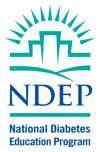 The National Diabetes Education Program (http://ndep.nih.gov/), an HHS program jointly sponso
The National Diabetes Education Program (http://ndep.nih.gov/), an HHS program jointly sponso red by the NIH and the Centers for Disease Control and Prevention (CDC), has partnered with the NIH Office of Research on Women’s Health to expand a post-gestational diabetes outreach and awareness initiative called, “It’s Never Too Early To Prevent Diabetes: A Lifetime of Small Steps for a Healthy Family.” The primary goals of this campaign are to:
red by the NIH and the Centers for Disease Control and Prevention (CDC), has partnered with the NIH Office of Research on Women’s Health to expand a post-gestational diabetes outreach and awareness initiative called, “It’s Never Too Early To Prevent Diabetes: A Lifetime of Small Steps for a Healthy Family.” The primary goals of this campaign are to: - Decrease incidence of type 2 diabetes among women with a history of gestational diabetes;
- Increase awareness of risks for obesity and diabetes among families with children whose mothers were diagnosed with gestational diabetes; and
- Expand outreach to health care professionals who are counseling women about future health risks and the importance of adopting and maintaining healthy behaviors in families affected by gestational diabetes.
In addition, NIDDK has received funding through the American Recovery and Reinvestment Act of 2009 to increase adoption of early intervention strategies to prevent diabetes after gestational diabetes mellitus, or GDM. This comparative effectiveness research study will test outreach approaches that may encourage post-partum testing and enrollment of women with gestational diabetes in behavior change programs. NIDDK supports communication among federal agencies on chronic kidney disease

A committee mandated to improve the coordination of federal resources and response to chronic kidney disease is picking up momentum, with the National Kidney Disease Education Program (NKDEP) helping organize and expand the role of the Kidney Interagency Coordinating Committee – or KICC.
KICC has grown from an annual meeting to an organization that supports member agencies by sharing information and activities and creating opportunities for collaboration, including serving as a forum for discussion between agencies on objectives related to chronic kidney disease for Healthy People 2020, a NIDDK-led program.
Currently, KICC is assisting the CDC in developing and promoting materials on chronic kidney disease and using NKDEP materials in a “toolkit” of guidelines for primary care physicians to use in understanding Clinical Practice Guidelines for the Management of Chronic Kidney Disease for the Veterans Health Administration and the U.S. Department of Defense.
For more information: www.nkdep.nih.gov/about/kicc/

Congratulations to …
The National Collaboration on Childhood Obesity Research (NCCOR)
was selected in August by HHS Secretary Kathleen Sebelius as one of three winners of the first HHSInnovates program, which is aimed at supporting the department’s "culture of innovation." NCCOR is a public-private collaboration, formed to help reverse the epidemic of overweight and obesity in U.S. youth by steering research across institutions, enabling a more nimble research response and quicker identification of needs. Partners include the NIH, CDC, Robert Wood Johnson Foundation (RWJF) and the U.S. Department of Agriculture. NIDDK has been involved in NCCOR since its inception and Dr. Griffin P. Rodgers was among the NIH leadership who planted the seeds for this collaboration along with the RWJF and CDC more than three years ago. NIDDK leadership and scientific staff continue to contribute to NCCOR. 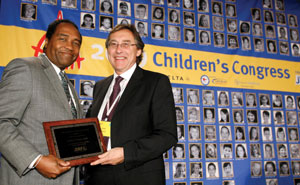
NIDDK
received a Juvenile Diabetes Research Foundation Children’s Congress Hero Award—the organization’s top honor—for the Institute’s steadfast commitment to finding a cure for type 1 diabetes. Five members joined the NIDDK Advisory Council for 2010. Judy Hunt and Dr. Francine Kaufman joined the Subcouncil for the 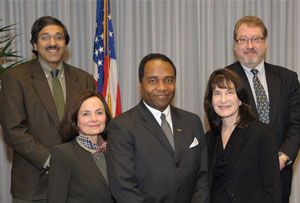 Division of Diabetes, Endocrinology and Metabolic Diseases. Hunt is also on the board of the Juvenile Diabetes Research Foundation International. Kaufman, a pediatrician, is chief medical officer at Medtronic Diabetes, which develops insulin pumps and other technology for diabetes care. Dr. Gregory Gores, Jane Holt and Dr. Anil Rustgi joined the Subcouncil for the Division of Digestive Diseases and Nutrition. Gores holds the Reuben R. Eisenberg professorship and serves as chair of the gastroenterology and hepatology departments at the Mayo Clinic in Rochester, Minn. Holt co-founded and serves as co-president of the National Pancreas Foundation and helps lead the Digestive Diseases National Coalition. Rustgi holds the T. Grier Miller professorship and serves as chief of gastroenterology at the University of Pennsylvania School of Medicine. Learn more about them in the NIH Record: http://nihrecord.od.nih.gov/pdfs/2010/05142010_Record.pdf.
Division of Diabetes, Endocrinology and Metabolic Diseases. Hunt is also on the board of the Juvenile Diabetes Research Foundation International. Kaufman, a pediatrician, is chief medical officer at Medtronic Diabetes, which develops insulin pumps and other technology for diabetes care. Dr. Gregory Gores, Jane Holt and Dr. Anil Rustgi joined the Subcouncil for the Division of Digestive Diseases and Nutrition. Gores holds the Reuben R. Eisenberg professorship and serves as chair of the gastroenterology and hepatology departments at the Mayo Clinic in Rochester, Minn. Holt co-founded and serves as co-president of the National Pancreas Foundation and helps lead the Digestive Diseases National Coalition. Rustgi holds the T. Grier Miller professorship and serves as chief of gastroenterology at the University of Pennsylvania School of Medicine. Learn more about them in the NIH Record: http://nihrecord.od.nih.gov/pdfs/2010/05142010_Record.pdf. 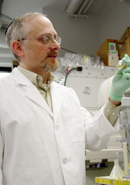
Dr. Kenneth A. Jacobson,
chief of the Molecular Recognition Section and chief of the Laboratory of Bioorganic Chemistry, was inducted into the American Chemical Society’s Medicinal Chemistry Hall of Fame. Jacobson is one of only four NIH researchers – all at NIDDK – ever to receive this honor (www.acsmedchem.org/jacobson.html).
Advisory Council Member Dr. William E. Mitch received the 2009 John P. Peters Award from the American Society of Nephrology for substantial research contributions to the discipline of nephrology and sustained achievements in academic medicine (http://www.asn-online.org/awards/peters.aspx).
 Dr. Kristin Tarbell, a scientist within the Diabetes Branch of the intramural program, received a Presidential Early Career Award for Scientists and Engineers (PECASE) in 2009. PECASE is the highest honor bestowed by the U.S. government on outstanding scientists and engineers beginning their independent careers (http://www.whitehouse.gov/the_press_office/president-honors-outstanding-early-career-scientists).
Dr. Kristin Tarbell, a scientist within the Diabetes Branch of the intramural program, received a Presidential Early Career Award for Scientists and Engineers (PECASE) in 2009. PECASE is the highest honor bestowed by the U.S. government on outstanding scientists and engineers beginning their independent careers (http://www.whitehouse.gov/the_press_office/president-honors-outstanding-early-career-scientists).
NIDDK staff received NIH Director’s Awards in 2009 for their exemplary performance. Awardees are: Dr. Lawrence Agodoa, Dr. Christine Hunter, Dr. James Hyde, Irene Marquez-Garner, Edwina Martinez, Traci Melvin, Fran Plyler, Dr. Philip Smith and Dr. Brent Stanfield, with Drs. Hunter and Stanfield each receiving two awards. More information about these competitive and prestigious awards is available here: http://hr.od.nih.gov/performance/awards/directorawards.htm.
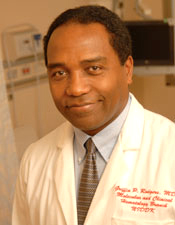
Editor’s Note: NIDDK Director Dr. Griffin P. Rodgers has been elected to the Institute of Medicine, one of the highest honors in the fields of health and medicine, in recognition of outstanding professional achievement and commitment to service (http://www.kidney.niddk.nih.gov/about/Research_Updates/UrologicDiseasesSpr10/6.htm).
Please welcome to NIDDK …Dr. James M. Anderson – a longtime NIDDK grantee – has been named the Director of the NIH Division of Program Coordination, Planning, and Strategic Initiatives, starting this month. Prior to this appointment, he was the professor and chair of the Department of Cell and Molecular Physiology in the School of Medicine at the University of North Carolina at Chapel Hill. Dr. Michael Flessner as a senior scientific officer within the Division of Kidney, Urology, and Hematology. In June, Flessner became the program director for Inflammatory Renal Disease Programs. Prior to coming to KUH, Flessner was the John Bower Professor of Nephrology and Hypertension and Professor of Medicine, Physiology and Biophysics and director of the Division of Nephrology at the University of Mississippi. Dr. Yuan-Who (Richard) Chen, who has joined NIDDK’s Biostatistics Group. Before joining NIDDK he worked at the FDA for eight years, where he reviewed investigational new drug protocols, biological license applications and nondisclosure agreements in several areas. A fond farewell to …Five NIDDK Advisory Council members, have completed terms: Dr. Mitch Lazar and Margery Perry served on the Division of Diabetes, Endocrinology, and Metabolic Diseases Subcouncil. Dr. Juanita Merchant, Dr. David Perlmutter and Lisa Richardson served on the Division of Digestive Diseases and Nutrition Subcouncil. 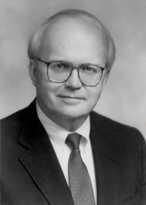 Dr. Leroy Nyberg, longtime director of the urology program, retired in late 2009. He joined NIDDK in 1988 and oversaw many important urology clinical trials and the Urologic Diseases in America compendium. While at NIDDK, Nyberg was recalled to active duty as a U.S. Navy Medical Officer and served in Saudi Arabia during the first Gulf War. |
Publication Calendar
The next edition of the Director’s Update will be online at www.directorsupdate.niddk.nih.gov on Tuesday, Dec. 7.
Submission information:To submit an item for the next Update, please contact Editor Amy F. Reiter at reiteraf@niddk.nih.gov. Items must be submitted six weeks before publication date – by Oct. 25 – to be included in the next issue.
Subscription information: The NIDDK Director’s Update is published quarterly in September, December, March and May. To subscribe to the Update, go to www.directorsupdate.niddk.nih.gov. The subscription box is near the top right of the page.
* Documents in PDF format require the free Adobe Acrobat Reader  application for viewing.
application for viewing.